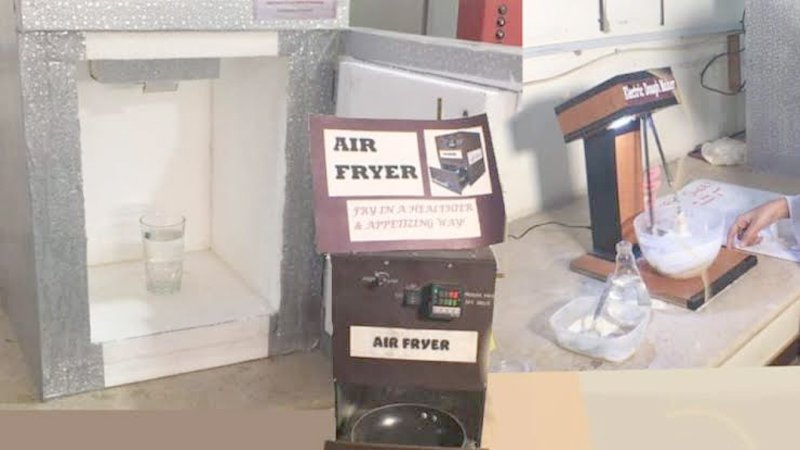The expo featured 13 projects, and different organisations expressed interest in working with the participants to advance their innovations, according to Dr. Zubala Yasir.
>
Students from the Food Science & Technology Department recently displayed a wide range of affordable and energy-efficient appliances meant to cook and preserve food at a food equipment expo that was held on campus at the University of Karachi.
The invention of Haris Kamran’s air fryer is a significant development in the world of cooking appliances. Air fryers work by using hot air to cook food instead of oil, making them a healthier alternative to traditional deep fryers. Kamran’s air fryer, which he built in just six days at a cost of Rs. 9,000, is an impressive feat of engineering and innovation.
By circulating hot air around the food, the air fryer can cook food quickly and evenly, without the need for large amounts of oil. This can significantly reduce the amount of fat and calories in the food, making it a healthier option for those who love fried foods.
Sohaib Malik’s mini refrigerator, which utilizes an eco-friendly thermoelectric microchip and less hazardous gas than conventional refrigerators, is a great example of how innovation can lead to more sustainable and efficient products.
By using a thermoelectric microchip, the mini refrigerator can provide cooling without the need for harmful refrigerants, which can have negative environmental impacts. This makes it a more environmentally friendly alternative to conventional refrigerators. In addition, the mini refrigerator’s use of less hazardous gas is safer to use and less harmful to the environment.
Ariba Khan’s dough-kneading device is a noteworthy invention that provides an energy-efficient solution for kneading large amounts of flour quickly and efficiently.
By using a 250-volt gear motor, the device can knead more than 5 kg of flour in a relatively short amount of time, which is a significant improvement over traditional manual methods. This can save time and effort for those who work with large amounts of dough, such as bakers and chefs.
The use of a motor also makes the device more energy-efficient, as it requires less physical effort to knead the dough. This can reduce the amount of energy required to make large batches of bread or other baked goods, making it a more sustainable and cost-effective option for commercial kitchens and bakeries.
According to Khan, the prototype for the dough-kneading device cost 10,000 rupees, which is a reasonable price for a device that can significantly improve the efficiency of baking operations.
Overall, the invention of Ariba Khan’s dough-kneading device represents an important contribution to the field of energy-efficient appliances. By using a motor to quickly and efficiently knead large amounts of dough, it offers a sustainable and cost-effective solution for commercial kitchens and bakeries.
The expo featured 13 projects, and different organisations expressed interest in working with the participants to advance their innovations, according to Assistant Professor Dr. Zubala Yasir.
